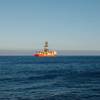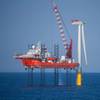Brazil Election Jitters May Hit Investments in 2014
Brazil's presidential vote will likely delay some investment decisions this year but spending on infrastructure is expected to remain strong, a senior government official told Reuters.
Although President Dilma Rousseff is the favorite to win the Oct. 5 general election, many investors could withhold funds until the next government outlines its plans for the following four years, which could hamper the country's already slow economic growth.
"It is obvious that businesses will delay some investments until after the election to have more clarity," said the official, who asked not to be named because he is not allowed to speak publicly.
"But investment in infrastructure will not be affected because a lot of that construction is already under contract."
The official, who is involved in economic policy decisions, said the government expects investment commitments of about 100 billion reais ($45.48 billion) between 2014 and 2015 in roads, ports, airports, power generation and distribution projects.
That figure was close to $83 billion in 2013.
Rousseff, a left-leaning technocrat, launched a multibillion dollar infrastructure package in 2012 precisely to bolster investment, which is one of the main bottlenecks holding back the economy of the once-booming emerging-market star.
Investments in Brazil jumped 6.3 percent last year, but as percentage of GDP it remains stuck at only 18 percent, which is less than half of China's investment rate.
The central bank cited a sharp drop in investment as one of the reasons it revised down its economic growth forecast to 2 percent in 2014 from 2.3 percent. The economy has expanded on average about 2 percent per year since 2011, a far cry from the 4-percent growth rates of the past decade.
The political climate in Brazil is considered the biggest deterrent for investment after high taxes and red tape in a survey of foreign and local investors released in January by international accounting firm KPMG.
The elections, in which governors and lawmakers will also be elected, already had an impact on the value of local assets.
A drop in Rousseff's popularity in recent weeks helped spark a rally in local stocks. The decline raised hopes among investors that Brazil could see changes in policies that they blame for destroying the market value of state companies and undermining the economy.
The stagnation of investment in Brazil has more to do with a series of business barriers known here as Custo Brasil or "Brazil Cost," which includes high taxes, cumbersome red tape, faulty infrastructure and scarcity of qualified labor.
"Potential investors are asking more questions about political risk in Brazil since the drop in Rousseff's popularity," said Maria Luisa Cravo, investment manager at business promotion agency ApexBrasil.
But ultimately the most important factor holding back investors is not politics but the difficulty of doing business in Brazil, which is undermining the nation's ability to compete.
"There will be a downward trend in direct investment in the next few years due to the Custo Brasil, rising interest rates and the very high cost of labor," she said.
(By Alonso Soto and Luciana Otoni; Additional reporting by Anthony Boadle; Writing by Alonso Soto; Editing by Lisa Shumaker)











